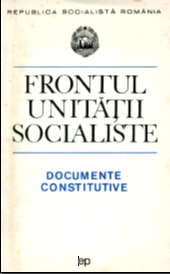

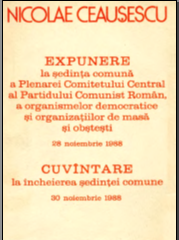
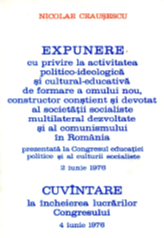
full title: EXPUNERE cu privire la activitatea politico-ideologică şi cultural-educativă de formare a omului nou, constructor conştient şi devotat al societăţii socialiste multilateral dezvoltate şi al comunismului în România, prezentată la Congresul educaţiei politice şi al culturii socialiste 2 iunie 1976CUVlNTARE la încheierea lucrărilor Congresului 4 iunie 1976 Expose on the Political, ideological, cultural and educational formation of the new man, creator of consdciousness and devotee of multilaterally developed socialist society and of communism in Romania. Presented at the Congress of Political Education and Socialist Culture on June 2, 1976. Speech delivered at the the conclusion of the Congress, June 4, 1976
More...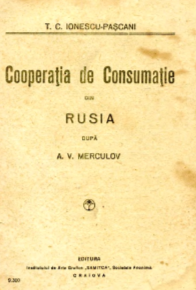
Published by: EDITURA Institutului d« Arte Grafice „SAMITCA", Societate Anonimă CRAIOVA 1918
More...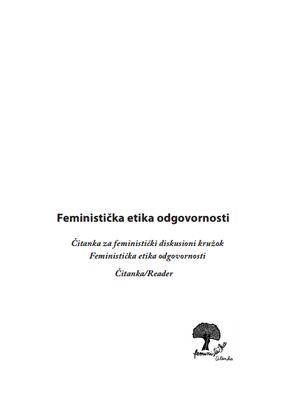

Keywords: Sandžak; European perspective; politics; marginalization; ethnic minority; Islam; Muslims; identity; integration; society; discrimination;
Sandžak, deo Srbije na tromeđi sa Bosnom i Crnom Gorom, gde živi najveći deo bošnjačke manjine u Srbiji, više od dve decenije je na udaru državne represivne politike u cilju marginalizacije te manjine. Odnos prema islamu i Muslimanima u Jugoslaviji počeo je da se zaoštrava i dobija neprijateljski prizvuk još osamdesetih godina prošlog veka, kada srpska elita pokreće kampanju protiv Muslimana i iznosi tezu o „islamskom fundamentalizmu koji preti da uništi Jugoslaviju“. To je bila priprema za genocid u Bosni, čije su posledice osetili i Bošnjaci u Sandžaku. Odnos prema muslimanima nije se suštinski promenio, ali se pod pritiskom evropskih organizacija kao što su Savet Evrope, OEBS i EU, država uzdržava od otvorene represije. Međutim, sada primenjuje druge metode poput kriminalizacije pojedinaca ili grupa (vehabije), ali pre svega, konstantnim podrivanjem Islamske zajednice (IZ) kao jedine institucije koju Bošnjaci imaju i koja je inače, od ključnog značaja za njihov identitet. Značaj Islamske zajednice za Bošnjake je izraz potrebe za religijom koja doprinosi jačanju vlastitiog identiteta i doprinosi integraciji društva. Potreba za jačanjem identiteta je i razumljiv odgovor na dugogodišnju diskriminaciju i „nevidljivost“, kao i policijski teror, otmice i likvidacije tokom rata u Bosni. Islamska zajednica je takođe, ključna identitetska matrica za bošnjačku zajednicu u odsustvu drugih institucija. Zbog toga je i bila na udaru Beograda i beogradskih „službi“, sa ciljem da se temeljno destabilizuje. To je dovelo do cepanja Islamske zajednice i podizanje tenzije unutar bošnjačke zajednice što može, ako bude potrebno, da se brzo pretvori u kriznu tačku.
More...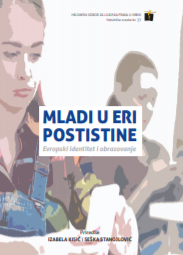
Keywords: European identity; education; youth; EU accession; democracy; pluralism; extremism; pluralism; framed reality; interculturalism; ethnic nationalism; liberal ideology; geopolitics;
(Serbian edition) Ongoing public debates frequently focus on European identity. What sparked off such debates were tremendous global changes after the Cold War, disappearance of two opposing blocs, ethnic conflicts, migrations, sociopolitical crises of liberal societies as well as the mass renouncement of value-based orientations Europe and the whole world had been built on after World War II and defeat of Nazism. People all over the world are now growingly concerned with the issues of statehood, ethnicity and the notion of “being a citizen.” Political manipulation of collective identities badly affects people’s lives and policies on which societies are being built. Many theoreticians are questioning – and with good reason – the very notion of collective identity, ethnic in the first place, as extremely exclusive. The Helsinki Committee for Human Rights in Serbia has launched a series of round tables under the title “Youth in a Post-Truth Era: European Identity and Education.” Participants were intellectuals of younger generations mostly, NGO activists and civil sector representatives, but secondary school and university students too. What we wanted achieve with these open debates – never devoid of controversial arguments – was to give shape to authentic views with impact on practical politics and (in)formal education of the youth. Our researches and experience in communication with young people show that they do care about collective identities, and that their ethnicities and religions are crucial in identity-building. Although they recognize the potential of Euro-integration for, say, better schooling or economic progress, a snail’s pace of the accession process and domestic propaganda make them turn to other international players. Young Serbs are turning to Russia and Putin, Bosniaks to Turkey and Erdogan, while young Hungarians to Serbia’s neighbor in the north and Orban. Revisionism also strongly influences the youth regardless of their ethnicities. They practically always oppose strongly any questioning of patriarchal values and react fiercely to it. Value-based orientations as such are mostly the effects of the spread of fake news and narratives predominant in the media, schools environments and families; the narratives that forced their way into the public sphere in the 1980s, bloomed in the 1990s and are thriving now against the global backdrop. Is the narrative about European identity and education a key to changes and inclusive enough? When I say European identity I am not advocating for Euro-centrism, especially not now when it implies social and economic exclusion of people heading for Europe from various continents and countries, or those outside the European Union. In Balkan countries aspiring to EU membership European identity is used as a political instrument supportive to integration processes. At the same time, it supports the transfer from a one-dimensional, nationalistic and wartime identity to a multi-dimensional, civic one. As it has turned out so far, the issues of class consciousness, socioeconomic justice and the right to education for all will be predominant in the debates to come. We do not intend to impose alternative narratives on the youth but to capacitate them for critical thought; to help them recognize and stand up against social repression and collective identities that have been imposed on them and exclude any “otherness.” Ever since the early 1990s the European Commission has also been focused on the researches of European identity (or identities). The European bureaucracy was interested in it for very practical reasons: the European Commission’s concern with the manner in which different processes of identification with the European Union shape integrative processes and strengthen the sense of solidarity among Europeans. On the eve of the Gothenburg Summit in November 2017 the European Commission issued guidelines for strengthening of the common European identity through education and culture, under the motto “unity in diversity.” The document was meant for the European Parliament, the Council of Europe, the European Socioeconomic Committee and the Committee of Regions. It was motivated by the rise of populism “at home” and beyond the EU, the spread of fake news and manipulation of information networks. Given that the EU administration interferes not into educational systems and culture of its member-states but leaves them to national, regional and local authorities, its role is limited to strengthening of cooperation and support to national projects in these spheres. It realized that education and culture make Europe attractive for learning and working, attractive as a space of freedom and shared values reflected in fundamental rights and an open society. And education as such builds foundations for active citizenship and helps to prevent populism, xenophobia and violent radicalism. Education, along with culture, plays a key role in cross-border meetings and learning about the true meaning of “being a European.” According to an analysis commissioned by the European Commission, joint, cross-border actions such as engagement in social movements or in organizations with shared goals (such as ecologic organizations) can promote the sense for European identity since collective actions are always taking into consideration the “other’s” points of view. How to involve candidates for the membership of the EU in the debate on Europe’s future and identity (identities) is among major issues. Isolated periphery and people’s frustration with accession that is being constantly postponed incite Euroskepticism and passivity of the youth who actually stand for European integration. The publication “European Identity and Education” resulted from a series of discussions and debates organized by the Helsinki Committee. Its introductory section presents one of the essays and political analyses of the international and local context in which Serbia’s youth are being raised: “Democracy, Pluralism and Extremism” by Vladimir Gligorov. The following section presents readers with draft practical politics for those dealing with institutional and informal education of the young. These draft policies, actually suggestions, are about teaching methods that may efficiently develop critical thinking among the youth and their awareness about alternatives. Inter alia, the suggested approaches are meant to motivate young people to get actively involved in building of a democratic society based on pluralism, inter-culturalism, solidarity and socioeconomic rights. Recommendations can be summed up as follows: 1. Strengthening of the idea of active citizenship; 2. Media literacy and development of critical thinking of the youth; and 3. Development and modernization of educational programs and present approaches to education of school children. Drafts of public policies were on the agenda of debates held in Belgrade and Novi Sad with participation of scholars and activists from younger generations mostly, concerned with the issues of identity and education. This publication also presents excerpts from those debates. How possibly could cosmopolitanism, inter-culturalism, anti-fascism and open society be promoted in today’s Serbia but also in Europe where extremism, fear of “otherness,” concerns for the safeguard of one’s own national identity that is allegedly threatened, be on the up and up? This is one of major dilemmas facing us today. Few students have access to informal education that rests on the principles guiding a democratic society. Speaking from experience many participants in debates pointed to the lack in professional staffs involved in educational process. Civic education is being marginalized in elementary and secondary schools. The participants also presented well-thought-out arguments against religious teaching in school curricula. The majority of participants take that strengthening of informal education that would lead towards incorporation of similar contents and methods into the educational system could be a solution to the above-mentioned dilemma. That would be a chance for attracting young people whose interests and ambitions are well beyond the rigid educational system, they argue. Positive experiences of Yugoslavia’s interculturalism and socialism, and the common history and culture can be used as resources for strengthening interculturalism throughout the region. Small steps forward within institutions that depend, above all, on individual activism and courage are another possible approach to resolution. This publication is meant as a contribution to local but also more extensive debate on European identity and new European policies that would cope with today’s challenges by far more efficiently.
More...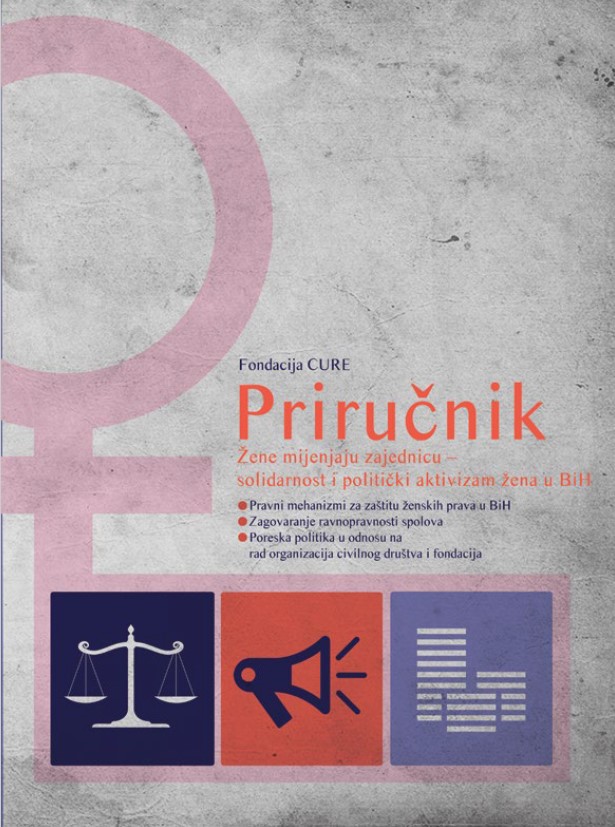
Keywords: Women's Rights; Gender equality; Violence in family; Protection of Human Rights; Legal instruments;
Ovaj Priručnik treba poslužiti svim ženama, naročito aktivistkinjama koje mnogo rade „na terenu“ pružajući podršku ženama. Svi pravni mehanizmi koje smo ovdje istakle su uspostavljeni kako bi nam omogućili suočavanje s konstantnim izazovima i pomogli nam da zaštitimo svoja prava. Ipak, trebamo znati da u svakom momentu ti mehanizmi proizlaze iz životnih situacija i prvenstveno su tu kako bi nam „olakšali život“. Iskreno se nadamo da će Priručnik biti vaš mali pokretač i smjernica za dalje aktivističke poduhvate. Molimo vas da nas obavještavate o vašim malim i velikim aktivističkim borbama, pobjedama i akcijama. Sve naše zajedničke solidarne borbe imaju samo jedan cilj koji je vezan za izgradnju slobodnog i ravnopravnog bh. društva.
More...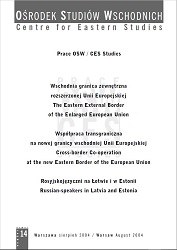
THE EASTERN EXTERNAL BORDER OF THE ENLARGED EUROPEAN UNION (Wschodnia granica zewn´trzna rozszerzonej Unii Europejskiej) by Bartosz Cichocki | ― | CROSS-BORDER CO-OPERATION AT THE NEW EASTERN BORDER OF THE EUROPEAN UNION (Współpraca transgraniczna na nowej granicy wschodniej Unii Europejskiej) by Rafał Sadowski | ― | RUSSIAN-SPEAKERS IN LATVIA AND ESTONIA (Rosyjskojęzyczni na Łotwie i w Estonii) by Joanna Hyndle and Miryna Kutysz
More...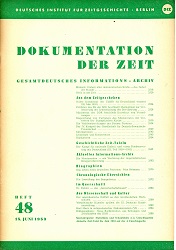
Hansen: Unity of all democratic forces - the order of the day // High Commissioner of the USSR for Germany appointed (May 28, 1953) // Politburo of the Central Committee of the SED adopts measures to improve the standard of living of the population // GDR Council of Ministers decides to correct regulations // Meeting of representatives of the Council of Ministers with representatives of the Evangelical Church // Preparations for the election of the Bonn parties // The IV Congress of the Society for German-Soviet Friendship // The struggle for national unity and a peace treaty with Germany (III, part 1950-1951) // The coal and steel union - a tool of imperialist war preparation // The life of a German patriot: Max Reimann // The tearing away of the Saar area // Dr. Dehler - the “union friend” // The American influence on the West German universities // West German artists greet the III. German art exhibition // Karl Marx in contemporary documentation (VI) // Bibliographies: New book literature, from newspapers and magazines of the GDR
More...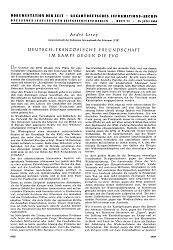
André Leroy, General Secretary of the Fédération Internationale des Résistants (FIR), Franco-German friendship in the fight against the EVG // Peter Seckbacher, All-German perspective after the II National Congress // II German National Congress on May 15 and 16, 1954 in Berlin // FDP MP Pfleiderer calls for the establishment of diplomatic relations with the USSR // Terror and persecution in West Germany and West Berlin // West Germany's military war potential (XIV) // A year of great success in realizing the new course // Care for people in the German Democratic Republic — — — — André Leroy, Generalsekretär der Fédération Internationale des Résistants (FIR), Deutsch-Französische Freundschaft im Kampf gegen die EVG // Peter Seckbacher, Gesamtdeutsche Perspektive nach dem II. Nationalkongress // II. Deutscher Nationalkongress am 15. and 16. Mai 1954 in Berlin // FDP-Abgeordneter Pfleiderer fordert die Herstellung diplomatischer Beziehungen zur UdSSR // Terror und Verfolgung in Westdeutschland und Westberlin // Das militärische Kriegspotential Westdeutschlands (XIV) // Ein Jahr großer Erfolge bei der Verwirklichung des neuen Kurses // Die Sorge um den Menschen in der Deutschen Demokratischen Republik
More...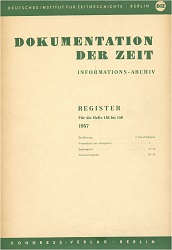
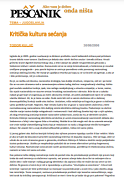
Keywords: Yugoslavia; war; politics; history; culture of remembrance; nationalism;
Izgleda da je 2005. godine suočavanje sa bliskom prošlošću novih balkanskih država pod pritiskom izvana dobilo nove tonove. Zaoštrena je debata oko ratnih zločina unutar i između država. Hrvati grčevito brane dignitet Domovinskog rata, a Srbi nastoje da ublaže neuporedivost genocida u Srebrenici ističući i ostale zločine. Domovinski rat se ne smije kriminalizovati, a Srebrenica je rezultat smišljene propagande – jesu parole kojima se umiruje povređeno vrelo ponosnog nacionalnog osećanja običnog čoveka. Ne manje je upadljiva retorika po kojoj su se svi branili od agresije, a ako je i bilo preterivanja, reč je o ekscesima.
More...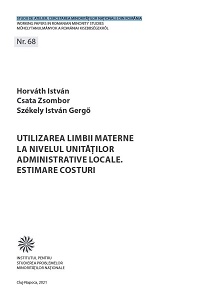
The study aims to operationalize and estimate the costs of implementing the rights of citizens belonging to a national minority to use their mother tongue in public administration. Identifies the areas of activity in which these obligations are generated, the forms of institutional organization through which the local administrative units manage them, the approximate volume of situations managed and the approximate additional costs compared to the situation where the local administration would use only the state language. The study is based on fieldwork that took place between July and October 2019, in which we used a complex survey tool and conducted interviews with local council representatives belonging to localities where the proportion of Hungarian residents exceeds 20%. The results show that the implementation of bilingual communication in local and county administrations involves significant costs, so - at least from the perspective of distributive justice - it is unfair for these costs to be borne exclusively by local governments.
More...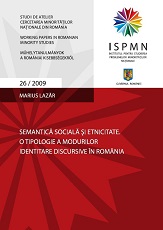
Keywords: Romania; ethnic relations; interethnic climate of Romania; Romanians; Hungarians; Roma population;
The present study redraws the map of ethnic relations in Romania on the basis of sociological surveys carried out by the Reseach Center on Inter-ethnic Relations (Centrul de Cercetare a Relaţiilor Interetnice,CCRIT) and by the Ethnocultural Diversity Resource Center (Centrul de Resurse pentru Diversitate Etnoculturală), together with the Metro Media Transilvania Institute and the Romanian Institute for Research on National Minorities (Institutul pentru Studierea Problemelor Minorităţilor Naţionale, ISPMN). The author participated in all of these surveys as either research coordinator or as a consultant; and although the aforementioned surveys had different objectives and were carried out in different contexts, they had a common denominator, i.e. they examined the interethnic climate in Romania by taking the mirror-images which the main ethnic groups (Romanians, Hungarians and the Roma) had about one another. Going beyond the descriptive level that was typical of the first attempts synthesizing the collected data, the study intends to synthesize the main attitudes and orientations of the population from Romania on the basis of ideal-typical attitudes and discourses corresponding with certain social segments. The study incorporates the longitudinal data which enable a unitary approach based on continuity, and record essential and relevant aspects for positioning the subjects in the field of inter-ethnicity.
More...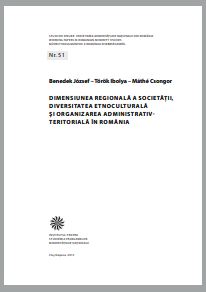
Keywords: Ethnocultural Diversity; Administrative-Territorial Organization; Romania; Economic homogenity; transport;
Public debates on the regional dimension of societal organization are plagued by a series of stereotypes originating in the lack of adequate knowledge about this phenomenon. Precisely because of this, the aim of this study is to present in a systematic and analytic manner the theoretical concepts, working methods and their possibilities of application in solving some technical aspects related to the efficient management of territory and the related issue of great actual relevance in Romania, the organization of development regions. We do not intend to elaborate an optimal solution to the problem, as we believe that no such recipe exists; conversely, we wish to contribute to the debate by sketching a number of scientifically grounded alternative proposals, the effective realization of which depends on the actual political context. While the material may seem too technical and difficult to digest without a solid background in the field, the specialized language was needed in order to meet certain requirements of scientific analysis.
More...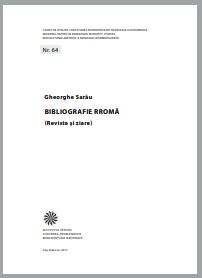
Keywords: Rroma bibliography; magazine and newspaper material; Romani language and literature; Roma education; 1987-2014;
The Rroma bibliography brings together magazines and newspapers that appeared in Romania and in various countries, especially after 1989, which were in the author's personal collection and were donated to the Institute for Studying the Problems of National Minorities in Romania. A similar collection, containing books, brochures and a small number of magazines and newspapers, was donated by the author in May 2015 to the Central University Library in Bucharest, the titles being inserted into a valuable guiding instrument (v. Gheorghe Sarau, Rroma bibliography (books, brochures, magazines, newspapers), Bucharest: University Publishing House, Bucharest, 2016), which helps librarians, researchers and the public interested in the Roma field, but also in support of Roma students from different specialties, or nerroms working with and for the Roma, both in the country and abroad. The journals and newspapers in the present bibliography fall within the scope of the Roma on Romani language and literature, history, anthropology, theater, music, sociology, politics, human rights, children's rights, Roma education, architecture and community development etc. between 1987 and 2014, and some in 1984-1986, 1978-1981 and 1970-1974. Although the collections of magazines and newspapers listed here do not fully cover the years of their appearance, they are still important milestones in the information and research activity in the field of Roma.
More...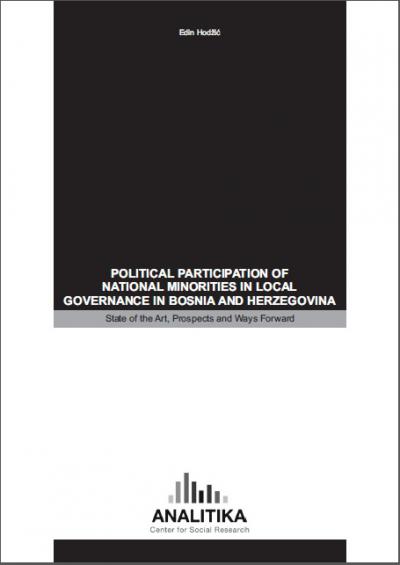
Keywords: BiH; political participation; minorities; Constitution; representation of minorities;
Pitanje participacije pripadnika nacionalnih manjina, kao dijela ustavne kategorije ’ostalih’, u političkom i javnom životu Bosne i Hercegovine (BiH), redovno izaziva zabrinutost međunarodnih organizacija i institucija. Kako ovi međunarodni akteri rječito navode, etnička raspodjela vlasti kroz složene mehanizme kolektivne političke jednakosti tri dominantne etničke grupe u državi (Srba, Hrvata i Bošnjaka – koji se u Ustavu nazivaju konstitutivnim narodima) jedna je od glavnih prepreka za ravnopravnu participaciju u javnim poslovima pripadnika nacionalnih manjina i drugih osoba koje ne pripadaju konstitutivnim narodima. Diskriminacija i isključenost heterogene ustavne kategorije ’ostalih’ u BiH, koja uključuje i pripadnike nacionalnih manjina, zaista su evidentni u različitim institucijama i oblastima. Primjer isključenosti manjinskih etnokulturnih grupa iz javnih poslova koji se najčešće spominje jeste ekskluzivno etnički koncipiran Ustav Bosne i Hercegovine, koji, između ostalog, sprječava izbor pripadnika manjina u tročlano Predsjedništvo BiH i njihovo delegiranje u Dom naroda Parlamentarne skupštine BiH. Međutim, čini se da su ove izričite mehanizme isključenosti koji su ugrađeni u Ustav potpuno zasjenili složeniji i suptilniji mehanizmi na nivou zakona i politika koji se odnose na postupke donošenja odluka na lokalnom, općinskom nivou. Iako takva isključenost ’ostalih’ zasigurno predstavlja diskriminaciju, isključenost iz političkog života jedne kategorije iz ove heterogene grupe – kategorije nacionalnih manjina – predstavlja kršenje drugog važnog prava – prava pripadnika nacionalnih manjina da učestvuju u političkom životu, u skladu s novijim međunarodnim instrumentima manjinskih prava. Naime, tokom posljednje decenije prošlog vijeka, doneseni su novi međunarodni instrumenti grupnih i manjinskih prava, kojima se priznaje i potvrđuje identitet i status manjina u nacionalnim ustavnim i političkim sistemima. Iznimno važna, čak prijelomna osobina ovih novih međunarodnih pravnih standarda jest izričito priznanje prava manjina da učestvuju u javnim poslovima. Ovaj novi standard političke participacije manjina formuliran je kao njihovo pravo da se očituju o javnim „pitanjima koja ih se tiču”. Na osnovu ovih novih standarda, regionalne institucije za ljudska prava, među njima prvenstveno Savjetodavni odbor (u daljnjem tekstu: SO) za Okvirnu konvenciju za zaštitu nacionalnih manjina (u daljnjem tekstu: Okvirna konvencija), su interpretirali pravo manjina na kolektivnu političku participaciju kao prilično „snažno” pravo, koje su stoga počele primjenjivati bezuvjetno, prenoseći manjinski kulturni identitet direktno u domen politike. Ovo je donekle iznenađujuće, jer su čak i optimističniji stručnjaci isprva bili skeptični u pogledu mogućnosti i dometa Okvirne konvencije, između ostalog, zbog njenog statusa okvirnog međunarodnog instrumenta. Međutim, kako tvrde pojedini utjecajni komentatori, SO za Okvirnu konvenciju pokazao se veoma uspješnim u osiguranju kolektivne političke participacije manjina u skladu sa odgovarajućim odredbama ovog instrumenta. Državni izvještaji i mišljenja SO u kontekstu okvirne konvencije, kao i razni drugi politički dokumenti evropskih institucija, sugeriraju da se koncept političke participacije manjina već duboko ukorijenio u panevropski političko-pravni poredak. Efikasna participacija manjina u javnim poslovima širok je koncept. Prvo, ona se može tumačiti kao participacija u užem smislu, kao postojanje predstavnika u izabranim tijelima na različitim nivoima vlasti, u izvršnim organima, ili u savjetodavnim tijelima, odborima i javnim vijećima. Participacija također može značiti članstvo u „poludržavnim tijelima, kao što su privredne i industrijske komore, u tijelima koja predstavljaju privredu i rad, u tijelima socijalnog osiguranja, u sindikatima, udruženjima poslodavaca i tripartitnim tijelima, te u odborima javnih radiotelevizijskih preduzeća”. Pored toga, participacija u javnim poslovima može obuhvatati različite oblike autonomije – od teritorijalnih i federalnih aranžmana do kulturne autonomije. Praksa SO za Okvirnu konvenciju, međutim, pokazuje da je pažnja ponajviše usmjerena na predstavljanje manjina u izabranim tijelima i u različitim oblicima konsultacija, dok su mehanizmi participacije u izvršnoj vlasti, u javnoj upravi, te u pravosudnim i drugim organima gotovo zanemareni. U svom posljednjem Mišljenju o Bosni i Hercegovini, Savjetodavni odbor za Okvirnu konvenciju potvrdio je da ovaj dvostruki mehanizam predstavljanja i konsultacija s manjinama na različitim nivoima vlasti nije na odgovarajući način zaživio u političkom sistemu i praksi u Bosni i Hercegovini. U ovom istraživačkom projektu upravo se istražuje koliko se ovo važno pravo koje se razvija provodi u složenom pravnom sistemu Bosne i Hercegovine i u podjednako složenoj praksi odlučivanja u državi, s fokusom na lokalni nivo vlasti. Drugim riječima, u ovoj studiji se istražuju mehanizmi isključenosti i uključenosti manjina u postupke odlučivanja na nivou općinskih vlasti. Važno je istaći da se čak i pripadnici konstitutivnih naroda u određenom kontekstu (tj. u pojedinim dijelovima države) mogu nalaziti u situaciji manjine i da se kao takvi mogu smatrati manjinama u smislu međunarodnih instrumenata manjinskih prava. Međutim, prema Zakonu o zaštiti prava pripadnika nacionalnih manjina BiH, manjina je definirana kao „dio stanovništva – državljana BiH koji ne pripadaju nijednom od tri konstitutivna naroda, a sačinjavaju je ljudi istog ili sličnog etničkog porijekla, iste ili slične tradicije, običaja, vjerovanja, jezika, kulture i duhovnosti i bliske ili srodne povijesti i drugih obilježja”. Ovaj istraživački projekat bavi se nacionalnim manjinama samo u ovom drugom smislu. U strukturi ove studije, najprije je ukratko izložen konceptualni i međunarodnopravni okvir. Nakon ovih uvodnih razmatranja, istražujemo pravni okvir, kao i praksu participacije pripadnika manjina u odlučivanju na lokalnom nivou u BiH. Iako su političko predstavljanje i mehanizmi konsultacija analizirani odvojeno, i u različitim poglavljima, svjesni smo međusobne povezanosti ova dva mehanizma, koji se prepliću kroz cijelu studiju.
More...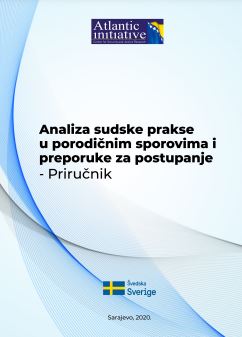
Keywords: BiH; family disputes; court practices; proceedings recommendations; manual;
U okviru Projekta “Rod i pravosuđe u Bosni i Hercegovini”, Atlantska inicijativa je formirala stručni Panel sudija/sutkinja (Svi izrazi upotrijebljeni u muškom gramatičkom rodu u ovom Priručniku odnose se bez diskriminacije i na žene) u cilju izrade preporuka i analize sudske prakse u oblasti porodičnopravnih sporova. Predmet teorijskih razmatranja i analize prakse, doduše, nisu svi sporovi iz oblasti porodičnog prava, već samo oni vezani za razvod braka, a od sporova nastalih u oblasti roditeljskog prava oni koji nastaju u vezi s ostvarivanjem roditeljskog staranja/vršenja roditeljskog prava u slučaju odvojenog života roditelja i održavanjem ličnih odnosa i neposrednih kontakata djeteta i roditelja, bilo da se o njima odlučuje u adhezionom postupku uz bračne sporove, bilo u samostalnom postupku. Ovu drugu grupu sporova kraće ćemo označavati kao sporove o staranju o djetetu nakon razvoda braka, a postupke u tim sporovima kao postupke odlučivanja o staranju o djetetu nakon razvoda braka. Priručnik je prvi materijal ove vrste i namijenjen je prije svega sudijama, ali i cijelom pravosuđu, studentima prava, akademskoj zajednici te domaćim i međunarodnim organizacijama zainteresovanim da rade na boljem razumijevanju ove problematike i unapređenju sudske prakse u oblasti porodičnog prava. Priručnik je podijeljen u šest poglavlja. U prvom poglavlju predmet razmatranja su rodne predrasude u postupcima razvoda braka i o ostvarivanju roditeljskog staranja; Drugo poglavlje sadrži pregled relevantnih međunarodnih izvora koji se odnose na roditeljsku odgovornost i najbolji interes djeteta; U trećem poglavlju prezentirani su, s teorijskog aspekta te u kontekstu opših komentara Komiteta za prava djeteta i domaćeg prava, principi Konvencije o pravima djeteta – najbolji interes djeteta te pravo na saslušanje djeteta i uvažavanje njegovog mišljenja; U okviru četvrtog poglavlja analizirano je zakonsko uređenje roditeljskog staranja, odnosno roditeljskog prava u Bosni i Hercegovini, domaća sudska praksa u ovoj oblasti i predmeti s međunarodnim elementom; U petom poglavlju dat je prikaz referentne prakse Evropskog suda za ljudska prava i Suda Evropske unije; Šesto poglavlje sadrži ključne preporuke Panela proistekle iz razmotrene sudske prakse u Bosni i Hercegovini Atlantska inicijativa se zahvaljuje učesnicama i učesnicima Panela, koji su svojim znanjem i posvećenošću radnom procesu doprinijeli da pravosuđe u Bosni i Hercegovini postane bogatije za još jedan značajan resursni materijal. Sastanke Panela i izradu ovog priručnika podržala je Švedska ambasada u Bosni i Hercegovini kroz projekat Rod i pravosuđe.
More...
Keywords: Taxes and fees; fiscal controls; fiscal facilities; single VAT rate; public administration.
The paper presents the results of a sociological research carried out in Romania on a national sample of 1,104 subjects. The data was collected between 9-14 June 2022, and the research was funded by the Tax Pact. The paper presents data on Romanians' preferences for a stable tax code, for merging some taxes and simplifying tax legislation, for certain legislative measures and proposals for the economic recovery of the country, about the progressive tax and about the perception of fiscal administrations.
More...